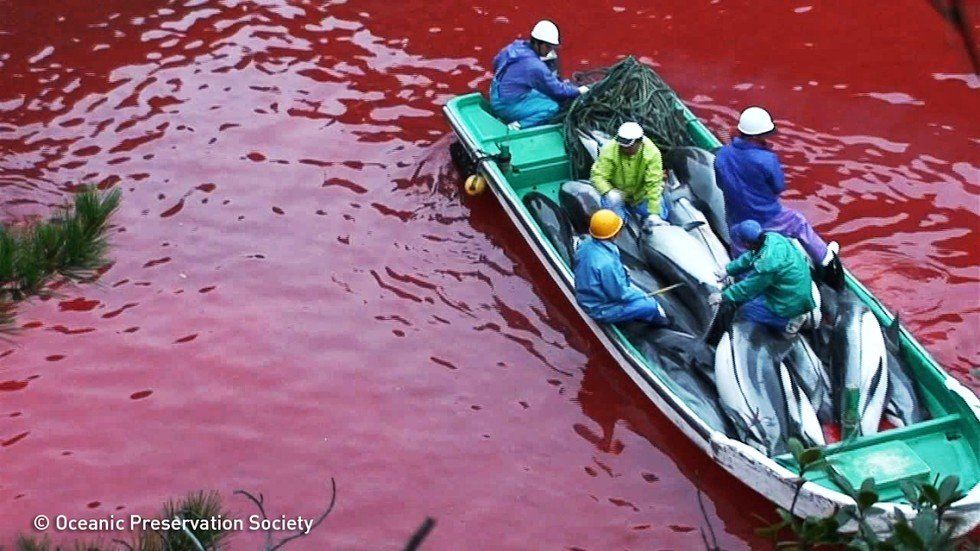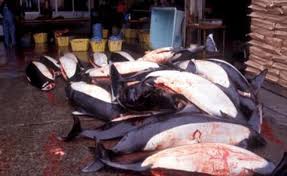Dolphin and porpoise slaughters in Japan continue in 2018
In the six-month marine hunting season in Taiji, just over 20 fishermen with a fleet of boats hunt and capture cetaceans often passing by on their migration route. They use loud noises to heard the dolphins by banging on metal poles set in place to create a wall of sound. As dolphins depend on echolocation to navigate under water, this technique is used to drive dolphins towards the shore to their impending deaths. The dolphins are then caught, slaughtered for meat or sold off to aquariums to live in pools that are too small to allow them to exhibit natural behaviours.
Calves caught along with their mothers are thrown back to sea as fishermen deem their smaller size a wasteful contribution to the quota. Without their mother’s protection, these calves are unlikely to survive.
In 2009, director and former National Geographic photographer, Louie Psihoyos and fromer captive dolphin trainer/turned activist; Ric O’Barry worked with the Ocean Preservation Society to expose the brutal practice of Japanese fisherman who capture and slaughter dolphins. After analysing and questioning the dolphin hunting practices of the fisherman in Taiji, Japan, a documentary film titled ‘ The Cove’ was released. Told from an ocean conservationist’s point of view, the documentary focuses on a covert mission to infiltrate a cove that contains a dirty secret, well hidden from the rest of the world. It also discusses the need to stop mass dolphin kills, alter the fishing practices in Japan and educate the public about the risks of mercury poisoning resulting from dolphin meat.
The release of the film stirred up a multitude of reactions. As the whale and dolphin hunting season starts in September and ends in April annually, a larger number of activists (both Japanese and non-Japanese) have flocked to Taiji to protest and film the slaughter. All attempts to film or view the hunting process were futile due to physical blockades by the local authorities and through intimidation and anger from the fishermen. To keep the cove and the killing acts further under wraps, the fishermen have started building more tarps to hide the distasteful acts from the public. The Japanese government released a statement supporting the hunt by saying that the acts are part of ‘traditional fishery’ and that it has been lawfully carried out, adhering to a set quota.
Today, that quota is capped at 2,040 kills and almost a 1000 dolphins are slaughtered annually. According to critics, the numbers are set “high enough to make the real number killed appear low”. While fishermen receive about $500 for a dead dolphin meat, the Taiji Whale museum buys a live dolphin from the hunters and holds them hostage in pens before selling one trained dolphin off to the aquariums for $150, 000. According to Ric O’Barry’s Dolphin Project, the museum subsides the hunting season.
But in 2017, eight years after the release of ‘The Cove’, the fishermen have broken their silence in an interview with the Guardian to discuss the hunt, the heritage and their determination to continue with the hunting traditions.
Yoshifumi Kai, a senior official with Taiji’s fisheries cooperative said in his article on the Guardian that: “We’ve mostly stayed silent since The Cove, and that’s why our point of view was never put across in the media”, adding that they are not ashamed of their actions because it is the most important part of their local traditions. While westerners farm animals to slaughter like cows and chickens, the Taji fishermen compare the dolphin slaughter to western cultures this a means to justify the dolphin hunt.A few points to consider when contemplating these traditions is the fact that more that 60% of wild animals are now extinct and Earth is currently going through it's 6th mass extinction. Dolphin and whale meat have also shown to have too high pollutant burdens to be fit for human consumption. Being top predators and therefore at the top of the food chain, pollutants such as persistent organic pollutants (POPs), bioaccumulate to the point where some species are so heavily burdened with pollutants they can no longer reproduce, take for example, killer whales ( Orcinius orca ) in the Shetland Islands, Scotland have been reduced to eight as individuals have not produced a single calf in 25 years.
Meanwhile, in Otsuchi, northern Japan, a hand harpoon hunt which kills Dall's porpoises ( Phocoenoides dalli )also continues today. The most recent hunting season for which information has been made available has shown Japan allocating a quota of 12, 364 Dall's porpoises in 2015/2016. Luckily, the catch has been less than the quota set for many years. In 2016, over a thousand porpoises were killed.
Both of these infamous hunts continue to supply Japanese consumers with cetacean meat loaded with toxic mercury and polychlorinated biphenyls (PCBs). Japanese scientists commissioned by the Environmental Investigations Agency, found Dall's porpoise sold near Tokyo to have PCB levels at a concentration of 4ppm (parts per million), a startling eight times above the regulatory level of 0.5 ppm. In total, almost 190,000 Dall's porpoises have been slaughtered in the past two decades, while the vast majority of Japanese citizens are kept in ignorance, and in many cases of even the species they are actually eating. Dall's porpoise is often processed and packaged as "whale meat" to increase it's value. Since catch records began in the early 1960's, more than half a million Dall's porpoises have been killed in Japan's waters, not to mention the countless numbers of other species which are hunted and killed in Taiji, or sold to captive facilities around the world.
© Ocean Research & Conservation Ireland (ORCireland) and www.orcireland.ie , est. 2017. Unauthorized use and/or duplication of this material without express and written permission from this site’s author and/or owner is strictly prohibited. Excerpts and links may be used, provided that full and clear credit is given to Ocean Research & Conservation Ireland and www.orcireland.ie with appropriate and specific direction to the original content.
SHARE THIS ARTICLE















